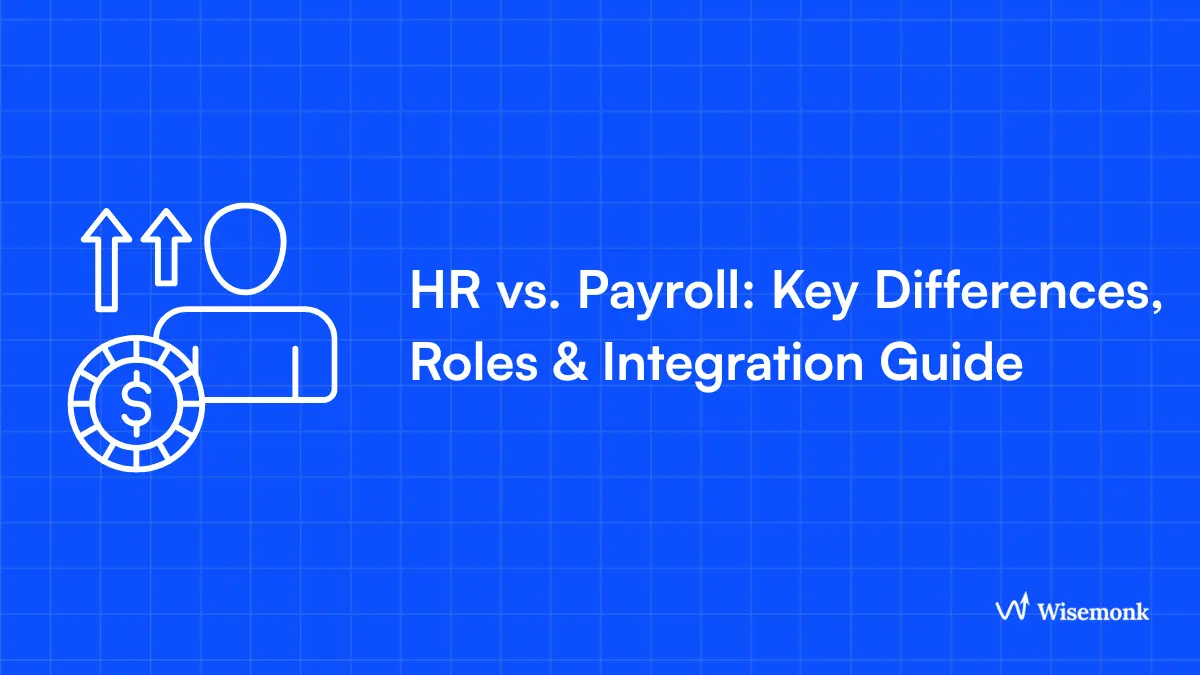- Offshoring to India means US companies move business processes like software development, finance, or customer support to India, achieving 30-50% cost savings, accessing 1.5 million engineering graduates annually, and enabling 24/7 follow-the-sun operations.
- Top industries offshoring to India include IT & software development, business process outsourcing (BPO), finance & accounting, customer support, and R&D, with tech hubs like Bangalore, New Delhi, and Pune offering specialized expertise and mature infrastructure.
- Four offshoring approaches: Global Capability Centers (GCCs) for full control, Employer of Record (EOR) for fast compliant hiring, BPO outsourcing for project-based work, or hybrid models combining nearshore and offshore strategies.
- Main challenges include navigating India's complex labor laws and data privacy gaps, hidden costs that add 20-30% to estimates, communication nuances across time zones, talent retention in competitive markets, and maintaining quality control without proper vetting and oversight.
Ready to offshoring your team to India? Contact us today!
Discover how we create impactful content.
What does offshoring to India really mean?[toc=Introduction]
Offshoring to India means US companies move specific business processes or functions such as software development, finance, or customer support to India to benefit from lower costs and a large pool of skilled professionals. It’s essentially about leveraging India’s talent, infrastructure, and cost effectiveness to streamline global business operations.
Why are companies outsourcing to India?[toc=Why India is Ideal Location]
Companies outsource to India mainly for cost savings and access to a vast pool of skilled professionals. It's not just about lower salaries, but also about efficiency, scalability, and 24/7 business operations.
From our experience helping several global businesses with outsourcing to India, here are the main reasons US companies continue to choose India as their preferred offshore location:
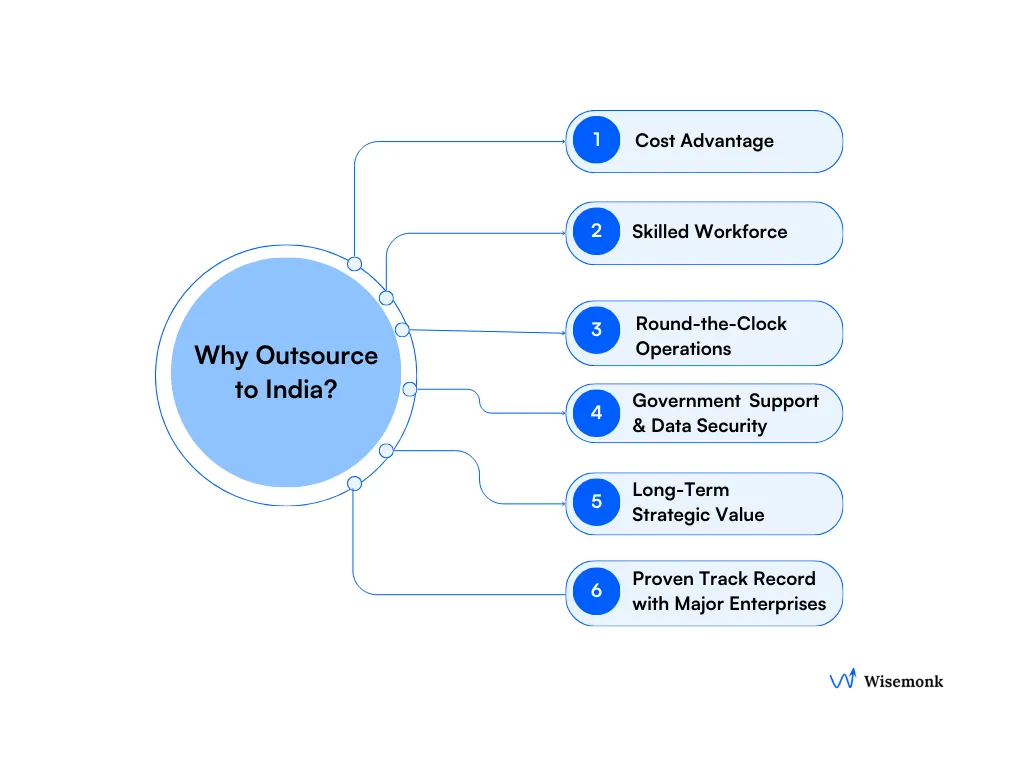
1. Cost Advantage
India offers clear cost effectiveness compared to the US. An experienced software engineer in Bangalore earns 50-70% less than a peer in New York or Silicon Valley. The average salary for a skilled developer in the US is $50-80 per hour, while in India it's $15-30 per hour.
When you factor in office space and overhead costs, offshoring to India can save companies 30-40% on most services. This cost advantage makes offshore outsourcing a financially smart decision for both startups and Fortune 500 companies.
2. Skilled Workforce
India produces over 1.5 million engineering graduates annually, creating a continuously refreshed talent pool. Indian professionals span IT, finance, customer support, and R&D. From software developers to analysts, the quality and availability of Indian employees has attracted businesses across industries.
Whether you need Indian developers for software development or specialists in business process outsourcing, India offers expertise at scale.
3. Round-the-Clock Operations
The time zone difference between the US and India enables a "follow-the-sun" workflow that maintains round-the-clock productivity. When US offices close, Indian teams pick up the baton, ensuring continuous development cycles, faster time-to-market, and uninterrupted customer support.
Call centers and back-office business processes ensure customer needs are met 24/7. This time zone advantage is a primary reason companies choose India over other countries for offshoring.
4. Government Support and Data Security
The Indian government supports the outsourcing market through tax benefits, IT parks in cities like Bangalore and New Delhi, and updated data protection laws. These business-friendly policies boost confidence among American companies about security and data privacy.
Initiatives like "Digital India" continue to improve India's information technology infrastructure, making it an increasingly reliable offshoring partner for US companies handling sensitive financial information.
5. Long-Term Strategic Value
What starts as a cost advantage often turns into a strategic decision. Businesses stay because of the quality of Indian workers, the flexibility of Indian service providers, and the ability to scale efficiently in a competitive global market.
India offers more than low cost, it delivers knowledge work, collaborative tools integration, and the expertise needed for complex business operations. This long-term value is why India ranks as the top choice for offshoring among US employers.
6. Proven Track Record with Major Enterprises
Companies like Goldman Sachs, Amazon, Deloitte, and General Electric are expanding their operations in Indian cities such as Bangalore and Pune. These aren't just cost centers, they're strategic innovation hubs handling core business processes.
For example, General Electric established one of its largest R&D centers in Bangalore, while Goldman Sachs runs sophisticated full-stack operations in India. This proven track record demonstrates that offshore employees in India can handle everything from software development to advanced analytics, making India the preferred offshore location for businesses seeking both cost efficiencies and world-class talent.
Expert Advice:
“India’s offshoring industry is no longer just about shaving costs. It’s evolving into a talent-access, resilience-building strategy. Companies that see their Indian teams not as back-office cost centers, but as core strategic partners, are the ones setting themselves up for long-term growth.”
— Phill Brown, Head of Market Intelligence, Robert Walters
Read the full article →
Which Industries benefit most from offshoring to India?[toc=Industries That Benefit]
The industries that benefit most from offshoring to India include IT & software development, finance & accounting, customer support, R&D, and business process outsourcing (BPO). These sectors rely heavily on skilled professionals, and India offers the right mix of expertise, scalability, and cost efficiency.
From our experience working with American companies and helping them set up offshore teams in India, here are the industries where offshoring delivers the strongest impact:
.webp)
1. Information Technology and Software Development
India is globally known for its information technology sector. Indian developers are in high demand for everything from application design to enterprise-level software development. Cities like Bangalore and New Delhi have become hubs for Indian service providers, attracting US companies that want both quality and cost advantage.
2. Finance and Accounting
Offshore outsourcing of financial information tasks, payroll, tax filing, bookkeeping, and compliance has become a standard practice. Skilled Indian professionals deliver accurate work at a fraction of US costs, reducing overhead costs while improving efficiency.
3. Customer Support and Call Centers
India’s call centers and BPO companies are still a backbone of global business processes. With strong English-speaking talent and a favorable time zone, offshore employees in India provide 24/7 support for American companies, improving service quality without increasing overhead costs.
4. Research and Development (R&D)
Knowledge work like R&D is another sector where India offers value. From pharmaceutical testing to product design, Indian employees contribute expertise that helps companies innovate while managing the cost of living and labor costs more effectively than in other countries.
5. Business Process Outsourcing (BPO) and Back Office
Business process outsourcing in India covers HR, recruitment, procurement, and data entry. Indian workers are trained in global practices, ensuring business operations run smoothly at scale. This is one of the most established models of offshoring partner collaboration.
In short, India offers low cost, high quality, and availability of talent across industries that matter most to US companies. That’s why offshore locations in India continue to outpace other countries in attracting global businesses.
What are the ways for US companies to offshore to India?[toc=Offshoring Models]
US companies can offshore to India by setting up their own Global Capability Centers (GCCs), partnering with an Employer of Record (EOR), outsourcing to BPO companies, or focusing on specific functions like IT, customer support, or finance. Each model has its own balance of cost effectiveness, control, and scalability.
From our experience helping global businesses expand to India, here are the main approaches to building a strong offshore presence:
.webp)
1. Setting up a Global Capability Center (GCC)
Many American companies, including large enterprises, establish their own GCCs in cities like Bangalore or New Delhi. This option offers maximum control over business operations, access to local talent, and full ownership of infrastructure. The tradeoff is higher upfront investment in office space, compliance, and hiring.
2. Partnering with an Employer of Record (EOR)
Working with an offshoring partner like an Employer of Record (EOR) allows US businesses to quickly hire Indian employees without setting up a legal entity. The EOR handles payroll, compliance, and benefits, while companies focus on their teams and projects. This is the fastest way to build offshore knowledge work teams with minimal overhead costs.
2. Outsourcing to BPO Companies
Traditional business process outsourcing remains a top choice for functions like HR, data entry, and customer support. Partnering with BPO services gives companies access to specialized service providers with established infrastructure and ready-made Indian workers.
3. Offshoring Specific Functions
Some companies don’t offshore entire departments but instead focus on high-impact areas like software development, financial information processing, or call centers. This helps optimize cost savings while still leveraging India’s vast pool of talent for niche tasks.
4. Hybrid Models
Many US companies now combine approaches. For example, they may hire Indian developers through an EOR for core projects while outsourcing repetitive business processes to a BPO company. This creates flexibility and allows them to scale based on project needs.
In short, whether it’s a full-fledged GCC or a flexible EOR partnership, India offers multiple offshoring models that balance cost efficiencies with access to world-class talent.
How to get outsourcing work from the USA to India?[toc=How to Outsource]
To outsource work from the US to India, companies need to identify the right functions to offshore, choose a reliable service provider or partner, and set up processes for compliance, collaboration, and quality control.
From our experience supporting US companies in building offshore teams in India, here’s the proven step-by-step roadmap to get outsourcing work from the USA to India:
Step 1: Define Business Needs
Decide which business processes or functions you want to offshore, whether it’s software development, customer support, finance, or back-office tasks. Start small with clear deliverables before scaling up.
Step 2: Research Offshore Locations
Evaluate India’s major hubs such as Bangalore, New Delhi, and emerging cities. Factors like office space availability, cost of living, and access to specialized Indian professionals should guide your choice.
Step 3: Select the Right Offshoring Partner
Choose between setting up a GCC, working with an EOR provider, or outsourcing to BPO companies. The decision depends on whether you want direct control, cost savings, or turnkey solutions with minimal overhead costs.
Step 4: Build the Offshore Team
Hire Indian employees through your chosen model. Whether you need software developers, finance experts, or call center agents, India offers a vast pool of talent across industries.
Step 5: Ensure Compliance and Data Protection
Make sure your partner follows Indian labor laws, tax rules, and data privacy standards. The Indian government has improved data protection frameworks, but global companies still need strict practices to secure sensitive financial information.
Step 6: Set Up Collaborative Tools
Use cloud-based platforms, collaborative tools, and clear communication practices to manage distributed teams. This ensures alignment despite time zone differences between the US and India.
Step 7: Monitor Performance and Scale
Track business operations through KPIs, case studies, and regular reviews. Once workflows stabilize, you can expand the scope to more functions or scale the number of offshore employees.
If you need help to choosing the right EOR provider, check out our article on "Best EOR Service Providers in India".
What challenges should you consider when offshoring to India?[toc=Challenges]
Offshoring to India brings significant cost advantages and access to talent, but US companies must also be mindful of challenges like compliance, cultural alignment, data security, and managing remote teams effectively. Addressing these upfront ensures smoother offshore operations.
From our experience working with international companies in India, here are the main challenges to consider:
- Compliance with Local Regulations: India has complex labor laws, tax rules, and statutory benefits that differ from US practices. Without the right offshoring partner or EOR provider, companies risk penalties or misclassification of Indian employees.
- Data Protection and Security: While the Indian government has strengthened data protection and data privacy frameworks, businesses must still ensure strict practices to protect financial information and sensitive client data. Security lapses can damage trust.
- Communication and Time Zone Gaps: The time zone difference can be an advantage, but it also creates coordination challenges. Without proper collaborative tools and processes, US and Indian workers may face delays in decision-making.
- Cultural and Workplace Practices: Differences in work culture and management styles can affect productivity. Understanding how Indian professionals approach deadlines, hierarchy, and feedback helps avoid friction in daily business processes.
- Quality Control and Oversight: Offshoring reduces overhead costs, but it requires strong monitoring. Companies must set clear KPIs and maintain regular performance checks to ensure offshore employees deliver consistent quality.
- Talent Retention and Competition: India’s competitive landscape means skilled Indian developers and other professionals often have multiple offers. Retaining top talent requires offering career growth, not just low cost salaries.
In short, the challenges of offshoring to India are real, but they’re manageable with the right structure, partner, and practices. Companies that plan for compliance, security, and talent retention enjoy the full benefits of India’s vast pool of talent and cost efficiencies.
What are the latest offshoring trends in India?[toc=Latest Offshoring Trends]
The latest trends in offshoring to India show a shift from just cost savings to value-driven strategies like digital transformation, hybrid workforce models, and specialized knowledge work. US companies are no longer only seeking cheaper labor - they’re building long-term offshore capabilities.
From our experience helping global businesses offshore to India, here are the most important trends shaping the market today:
- Rise of Digital Transformation: More American companies are outsourcing advanced areas such as AI, cloud engineering, and cybersecurity. India’s information technology ecosystem continues to grow, attracting demand for highly skilled Indian developers and engineers.
- Growth of Global Capability Centers (GCCs): Multinationals are increasingly setting up GCCs in Bangalore, New Delhi, and other tech hubs. This model offers end-to-end control of business operations while leveraging India’s vast pool of talent.
- Hybrid Outsourcing Models: Companies are mixing offshore outsourcing to BPO services with EOR-based hiring. This hybrid model gives flexibility to outsource routine business processes while directly managing high-value teams of Indian professionals.
- Focus on Data Security and Privacy: With global concerns around data protection, India has tightened its data privacy laws. This trend is pushing service providers to adopt global best practices in security, making it safer for US companies to offshore critical financial information and client data.
- Work over Call Centers: While call centers remain strong, the shift is toward knowledge work such as R&D, design, analytics, and product engineering. The demand for Indian employees with advanced expertise is reshaping how companies think about offshore employees.
- Competitive Landscape and Talent Retention: India still holds a clear cost advantage, but the competitive landscape for top talent is intensifying. Companies are now investing in retention strategies for Indian workers, offering career growth and global exposure instead of relying solely on the low cost of living factor.
- Competitive Landscape and Talent Retention: India still holds a clear cost advantage, but the competitive landscape for top talent is intensifying. Companies are now investing in retention strategies for Indian workers, offering career growth and global exposure instead of relying solely on the low cost of living factor.
According to Robert Walters’ recent research projects that India’s offshoring sector will hit US$ 467 billion by 2030, up nearly 76% from current levels. Read the full article →
Why Wisemonk is your ideal partner for offshoring to India?[toc=Why Choose Wisemonk]
Wisemonk is an India-focused Employer of Record (EOR) service designed to help global companies hire, pay, and manage employees in India without setting up a local entity. With a deep understanding of the Indian market, we handle the complexities so you can focus on growth.
Our team is dedicated to delivering a seamless experience from day one. Here's how we help you offshore to India:
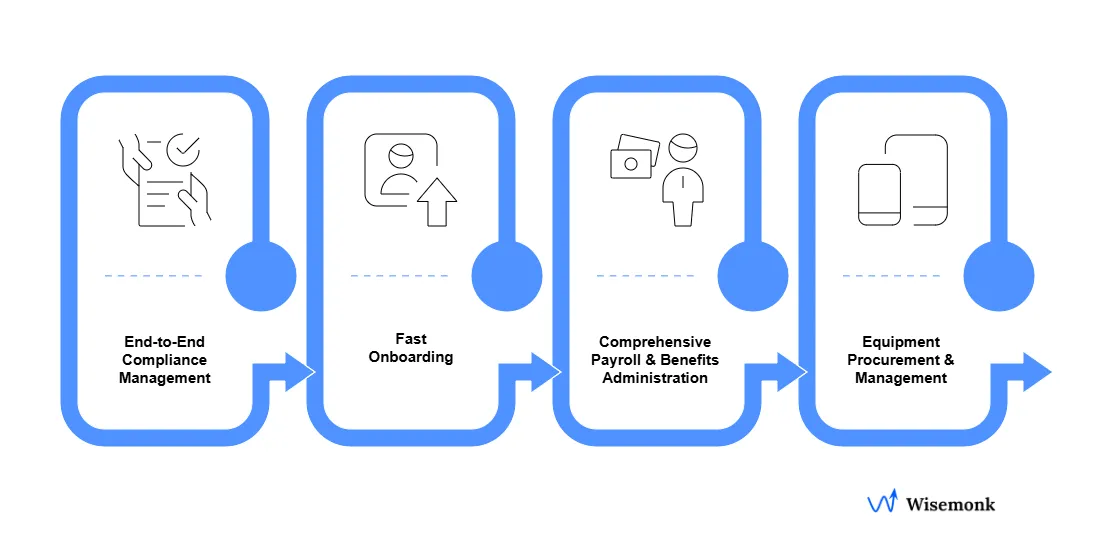
- End-to-End Compliance Management: We take care of all local employment contracts, payroll, tax withholdings, and statutory benefits, ensuring your business stays fully compliant with Indian regulations.
- Quick Onboarding: Wisemonk enables you to hire and onboard employees in India within just 2-4 days, drastically reducing your time-to-market.
- Comprehensive Payroll & Benefits Administration: We manage accurate payroll in India, Provident Fund, health insurance, and other statutory benefits, all tailored to Indian expectations.
- Equipment Procurement & Management: From sourcing to delivery and secure device management, we handle all hardware and software needs for your Indian team.
Beyond these, Wisemonk provides a range of services to further support your India operations. These include contractor management, background checks, office setup assistance, and ongoing dedicated HR support. Our integrated services also offers employee self-service portals and performance management tools, ensuring your team remains productive and engaged.
Ready to explore offshoring to India? Let us help you build a compliant, high-performing team that drives growth from day one. Reach out to us today!
Wisemonk Client review/feedback:
“I've been working with Wisemonk as an EOR employee for past two years. The onboarding call was really good and they even helped my team onboarding as well. They helped me with the macbook, iphone devices procurement. Their interface is good and I can manage my team in a single interface”
- Felix S.
Senior Software Development Engineer
Read the full review on G2 →
“Wisemonk was instrumental in identifying and assisting in the recruitment of three successful senior executives. The team took a hands-on approach to solving the client's needs, and Wisemonk iterated multiple approaches to problem-solving based on the client's needs and directional shifts.”
- Hariher B
Co-Founder, BuyEazzy
Read the full review on Clutch →
Frequently asked questions
Why are IT jobs being outsourced to India?
US companies achieve 50-70% cost savings on software development and information technology work. An experienced software developer in Bangalore costs $15-30/hour vs $50-80/hour in Silicon Valley. Beyond salary arbitrage, India produces 1.5 million engineering graduates annually, creating a vast pool of skilled Indian developers and professionals. The time zone difference enables follow-the-sun workflows, when US offices close, Indian teams maintain 24/7 business operations. Companies like Goldman Sachs, Amazon, and General Electric treat their Indian operations as strategic innovation hubs, not just cost centers.
Why is India an ideal offshoring destination?
India offers cost effectiveness, proven scale, and mature infrastructure with 1,700+ Global Capability Centers employing 1.6M+ professionals across Bangalore, New Delhi, and Pune. India's IT and BPO sectors are equipped with latest technology for high-quality services. The Indian government supports offshoring through Digital India initiatives, tax benefits, and strengthened data privacy frameworks under the Digital Personal Data Protection Act 2023.
What are the problems with outsourcing to India?
Key challenges include navigating complex labor laws (Code on Wages 2019 requires basic pay at 50%+ of total compensation), data security risks as India lacks comprehensive GDPR-level data privacy legislation, and hidden costs that add 20-30% to initial estimates from onboarding and quality assurance. Communication nuances matter, "yes" often means "I understand" not "I agree." Talent retention is challenging with 10-14% annual wage inflation in Bangalore and call center attrition reaching 35%. An experienced EOR provider handles compliance, statutory benefits, and security protocols.
Can I outsource my work to India?
Yes. American companies use three models: business process outsourcing through BPO companies for routine business processes, hiring through an EOR for quick compliant employment of Indian employees, or establishing a GCC for control of business operations. The US contributes 57% of India's IT sector revenue. India offers significant cost advantages on office space, overhead costs, and labor across software development, call centers, accounting services, and knowledge work.
How does offshoring to India compare to Latin America?
India leads in scale and specialized expertise, producing 1.5 million engineering graduates annually with 30+ years of proven experience in information technology, software development, and business process outsourcing. India's IT and BPO sectors are well-equipped with the latest technology and infrastructure for high-quality services. Latin America is emerging as a compelling alternative for accounting functions due to strategic time zone alignment with the US, cultural affinity that improves communication, and a growing talent pool. Both India and Latin America offer significant cost advantages compared to the US and maintain high service quality driven by competitive landscapes and international client expectations. Most American companies now use hybrid models, nearshoring to Latin America for real-time collaboration, offshoring to India for scale and specialized knowledge work at lower overhead costs.
How do I get outsourcing work from the USA to India?
Define which business processes to offshore, research offshore locations like Bangalore or New Delhi, and select an offshoring partner, BPO services, EOR provider like Wisemonk, or build a GCC. Ensure your partner handles data protection, Indian government regulations, and information security protocols. Test through a paid pilot project (2-4 weeks), set up collaborative tools to manage time zone differences, and define clear KPIs before scaling. Learn how to outsource to India here.
What percentage of US jobs are outsourced to India?
There's no official statistic. Useful indicators: US clients account for 57% of Indian IT-BPM revenues, and India commands 17.58% of worldwide outsourcing market. India ranks as the top country for IT and business process outsourcing, with its sector projected to hit $467 billion by 2030. Treat any "exact percentage" claim with skepticism.
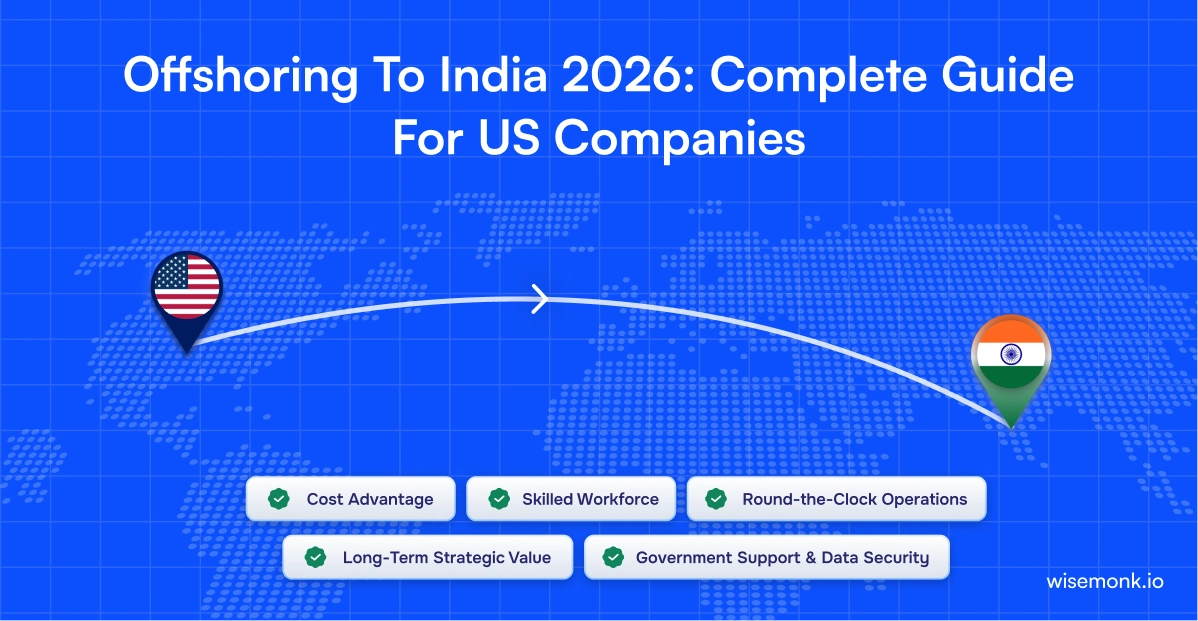


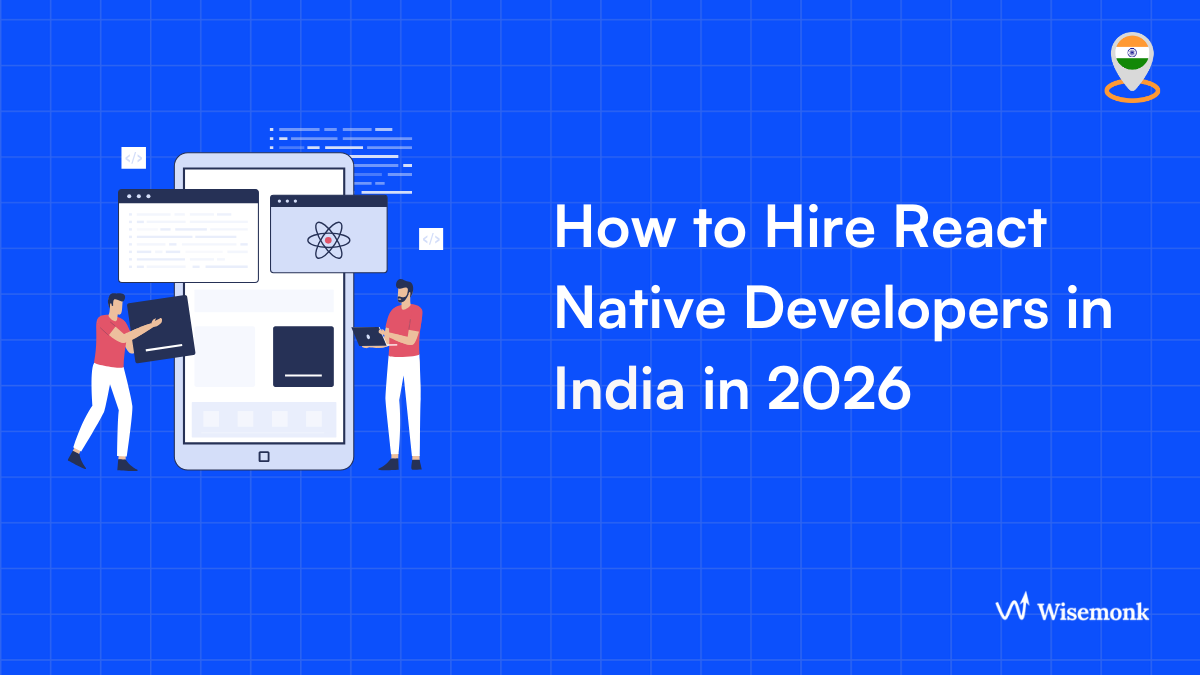

.webp)
.webp)

.webp)
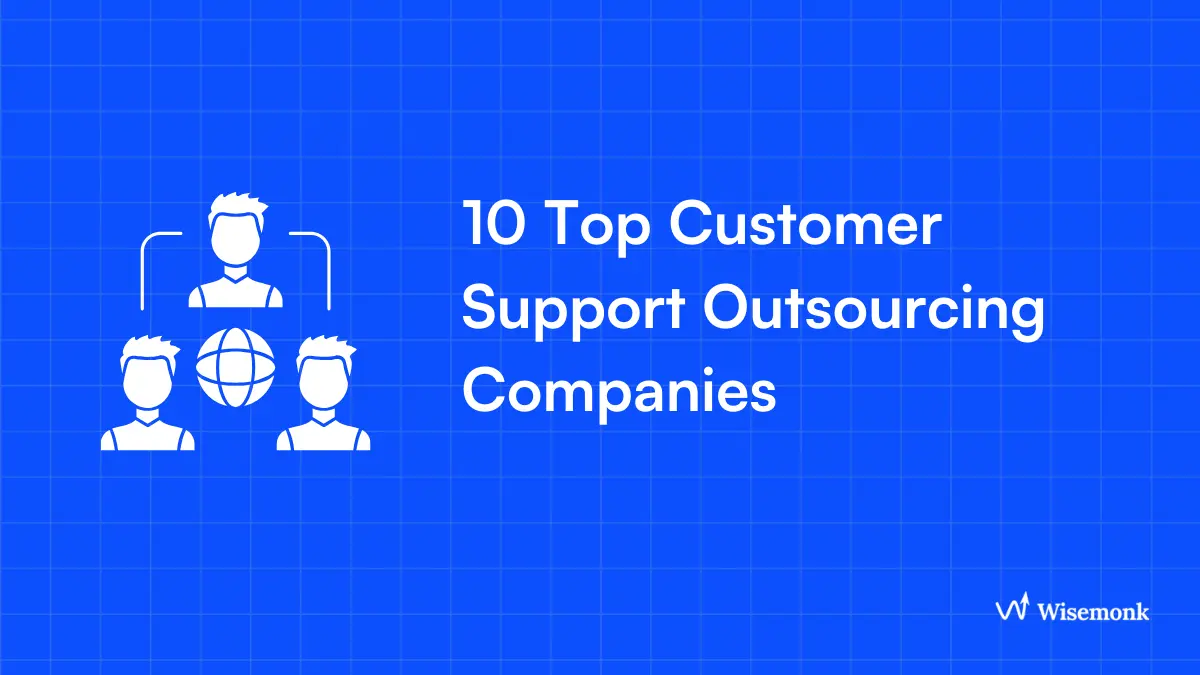
.webp)

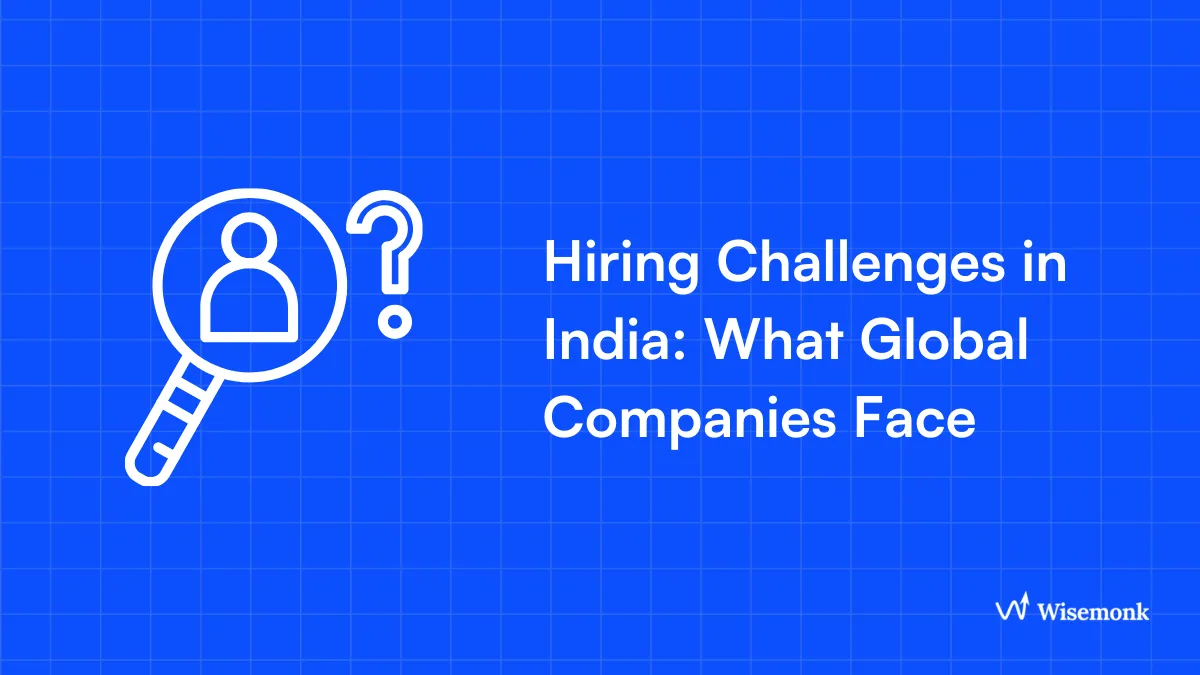

.webp)
.webp)

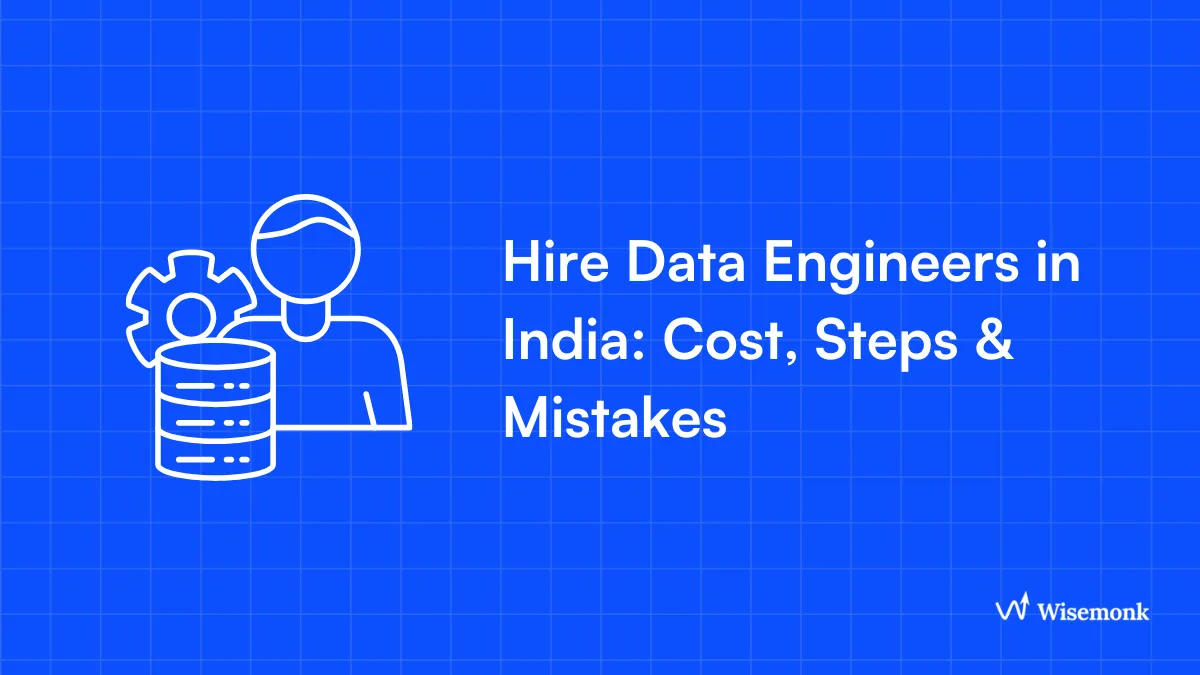




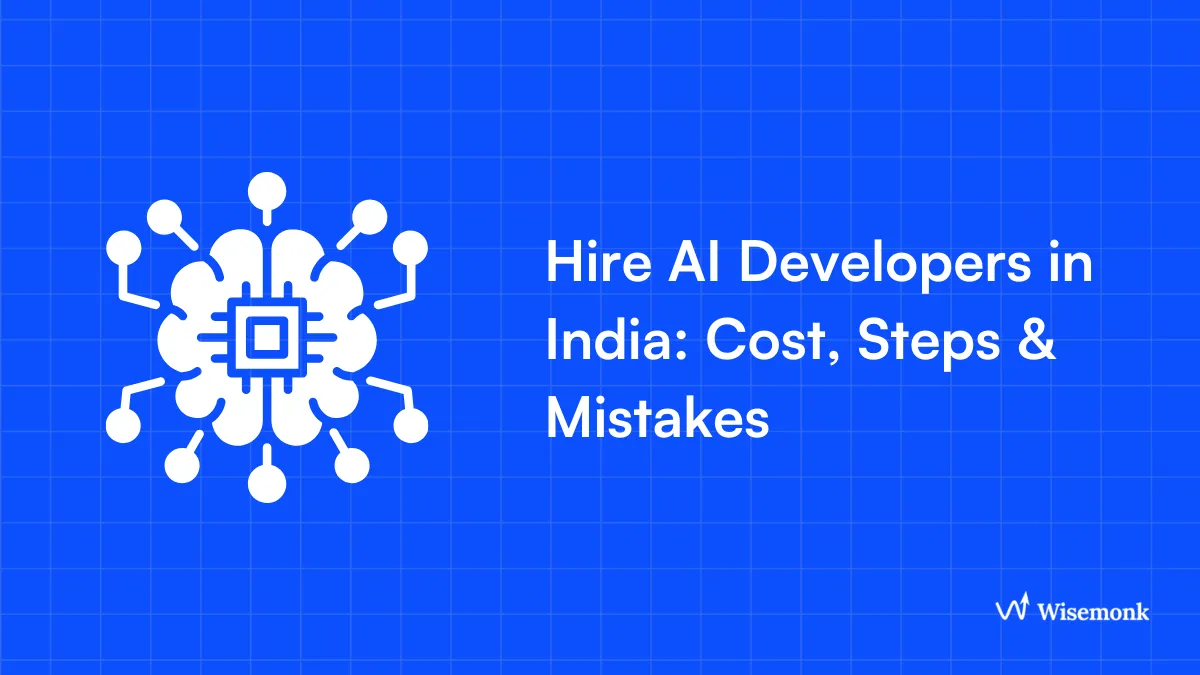
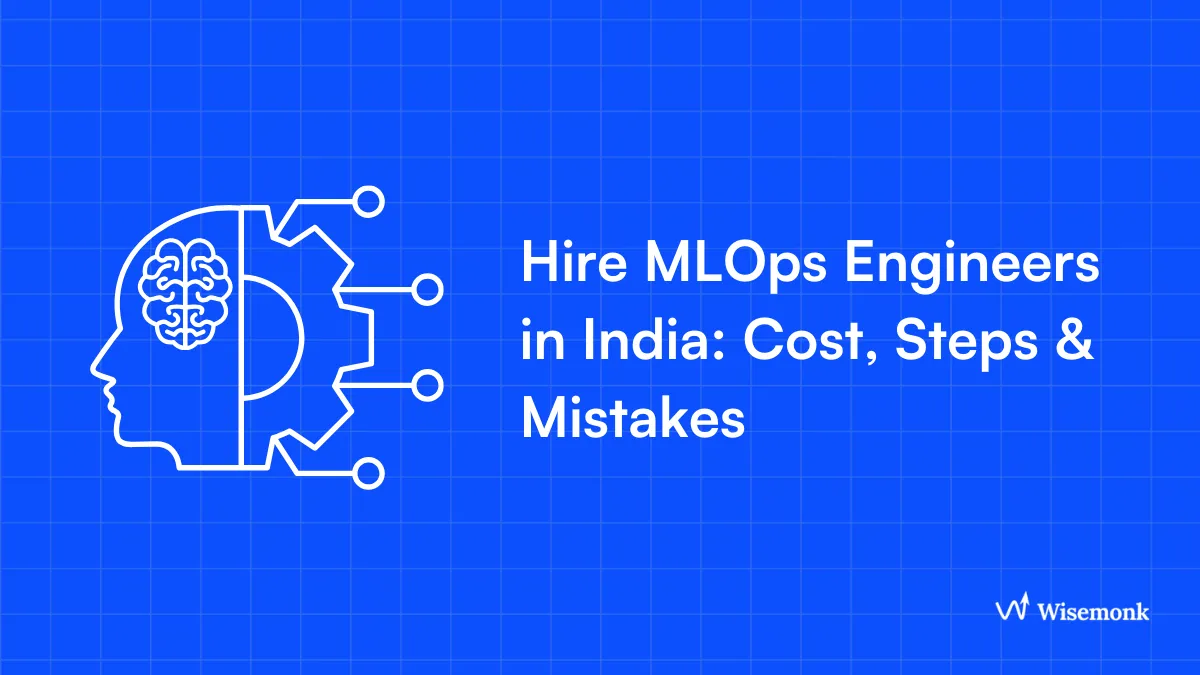

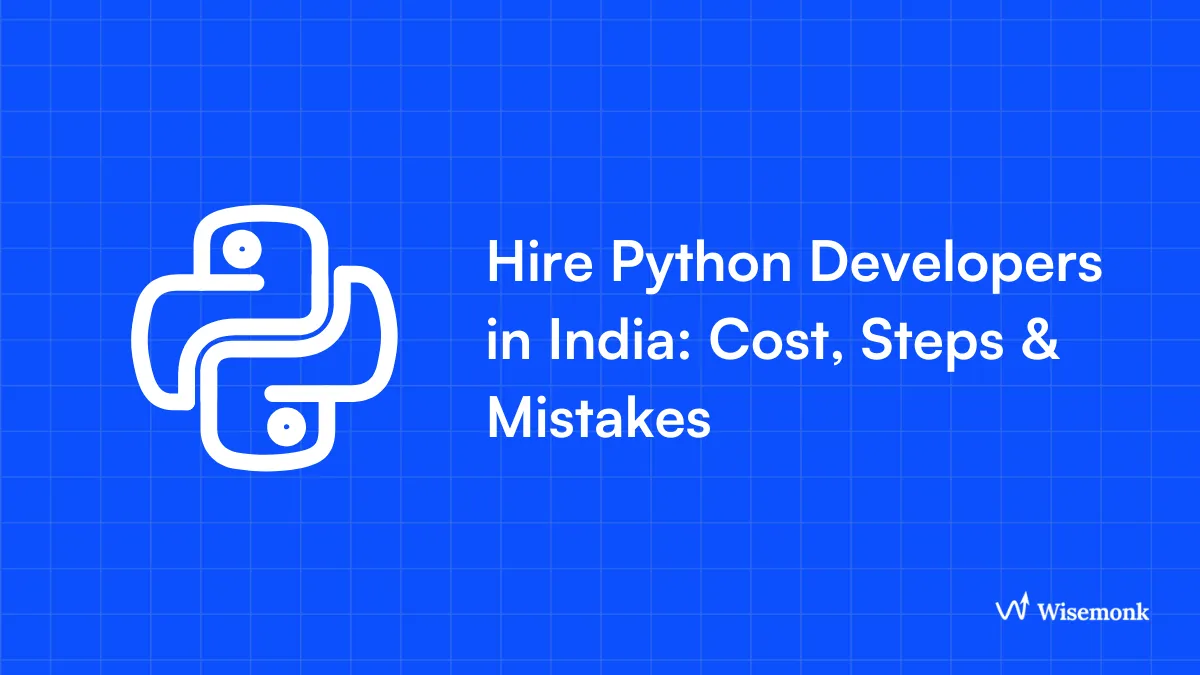




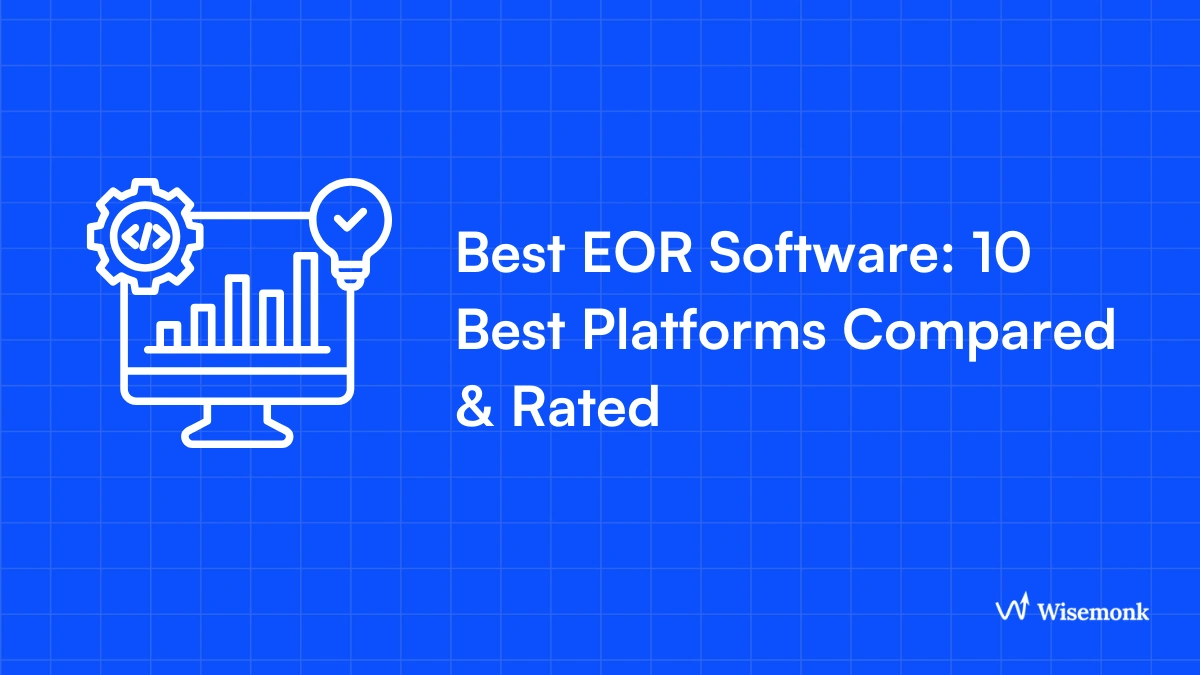
.webp)
.webp)
.webp)





.webp)

.webp)





.webp)





.webp)

%20in%20India.webp)
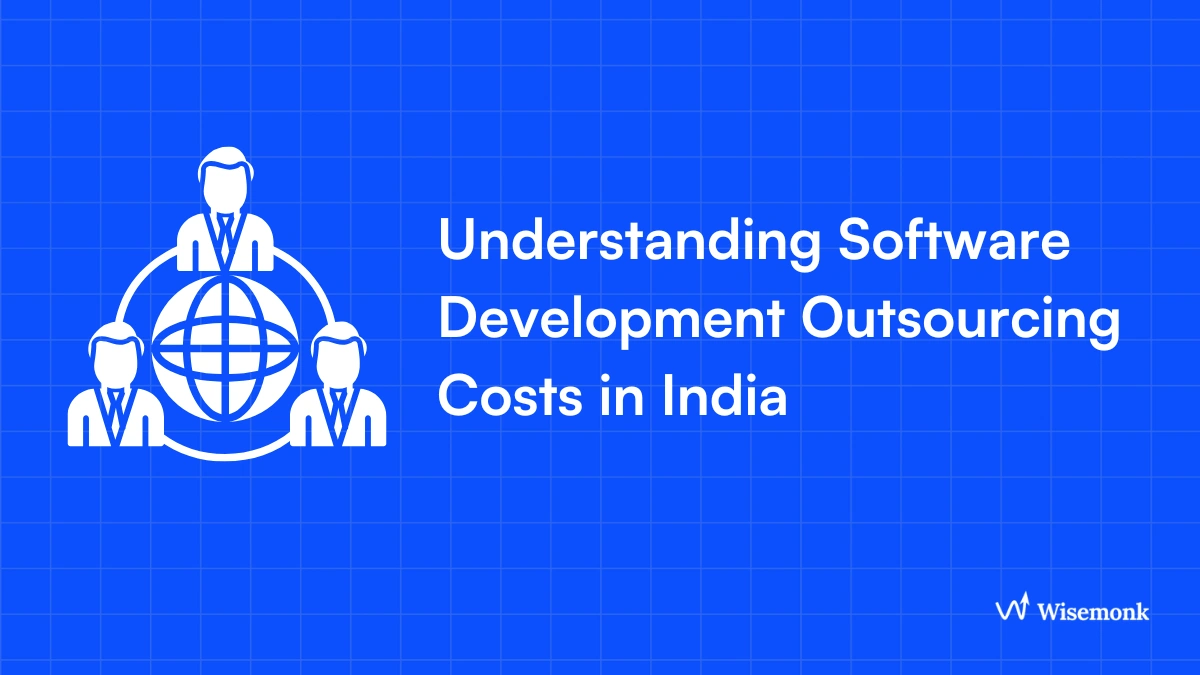


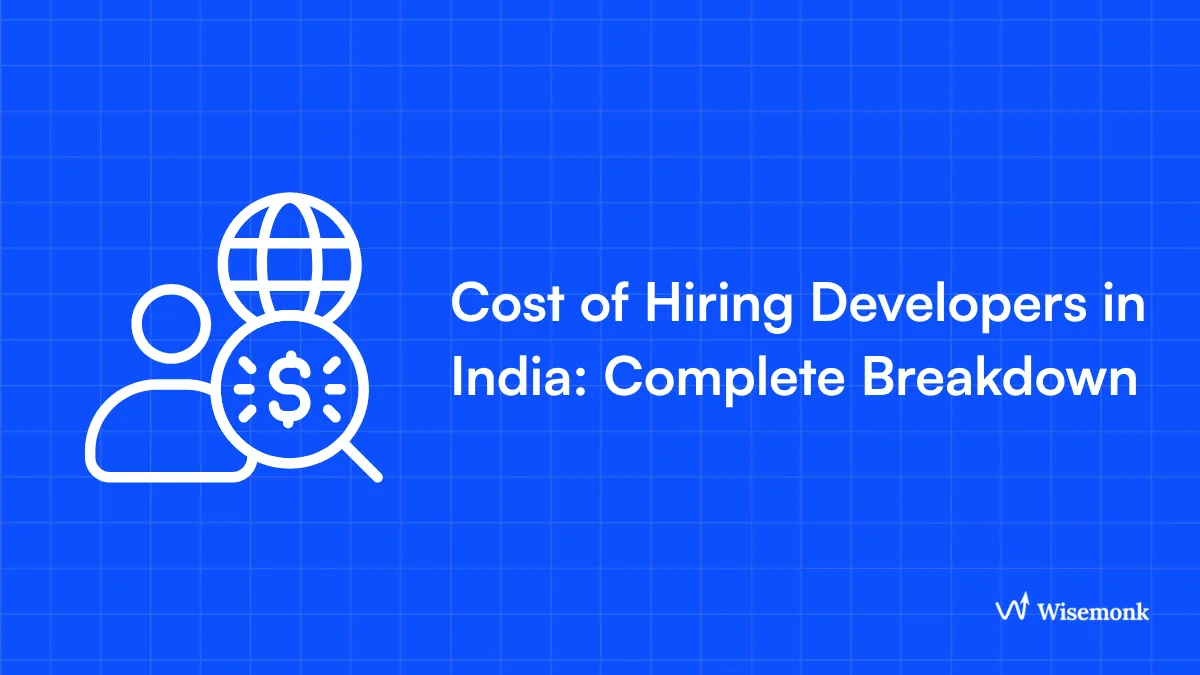

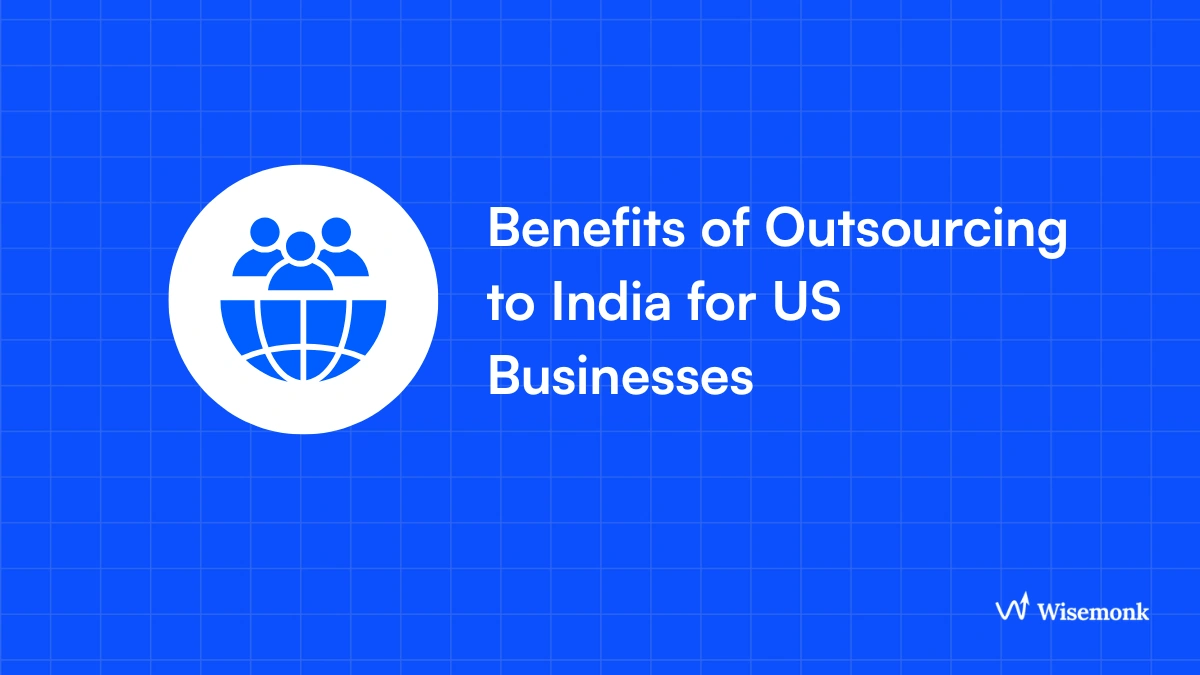

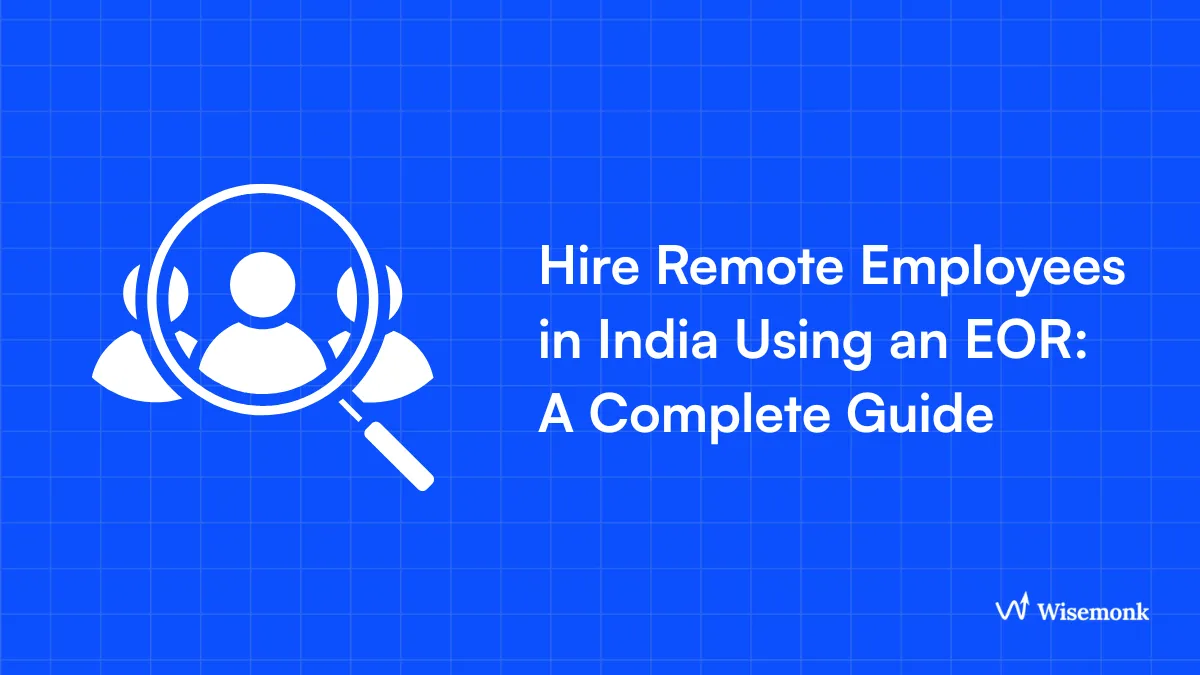



.webp)
.webp)



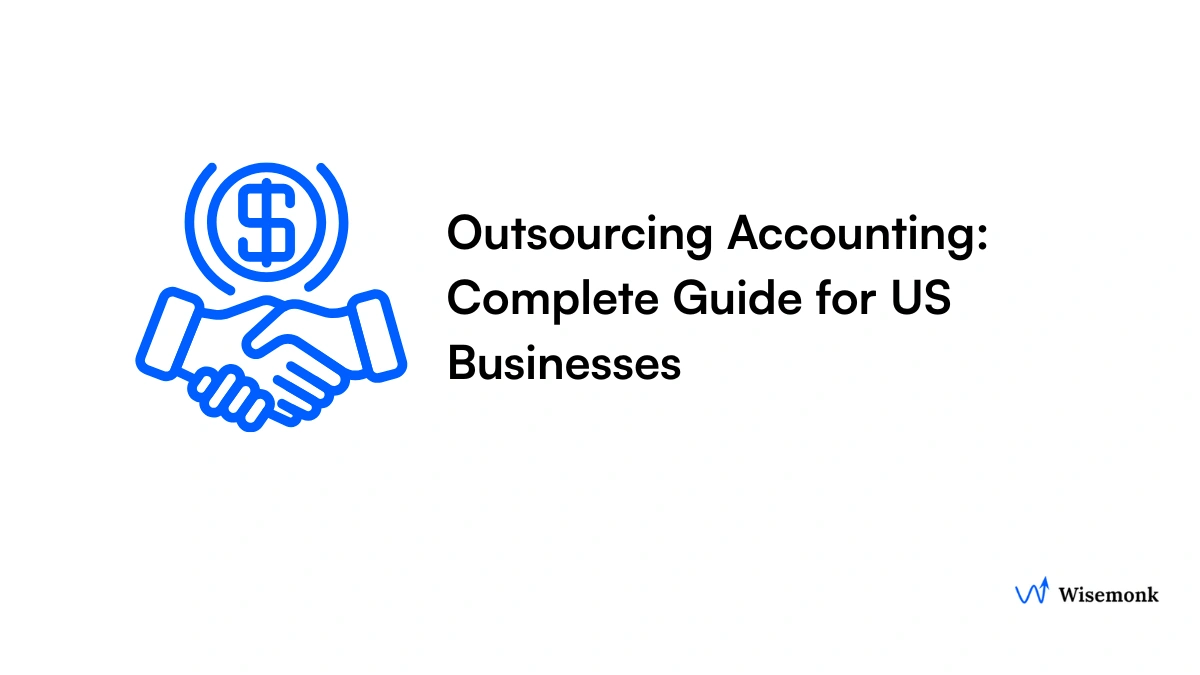
%20(3).webp)
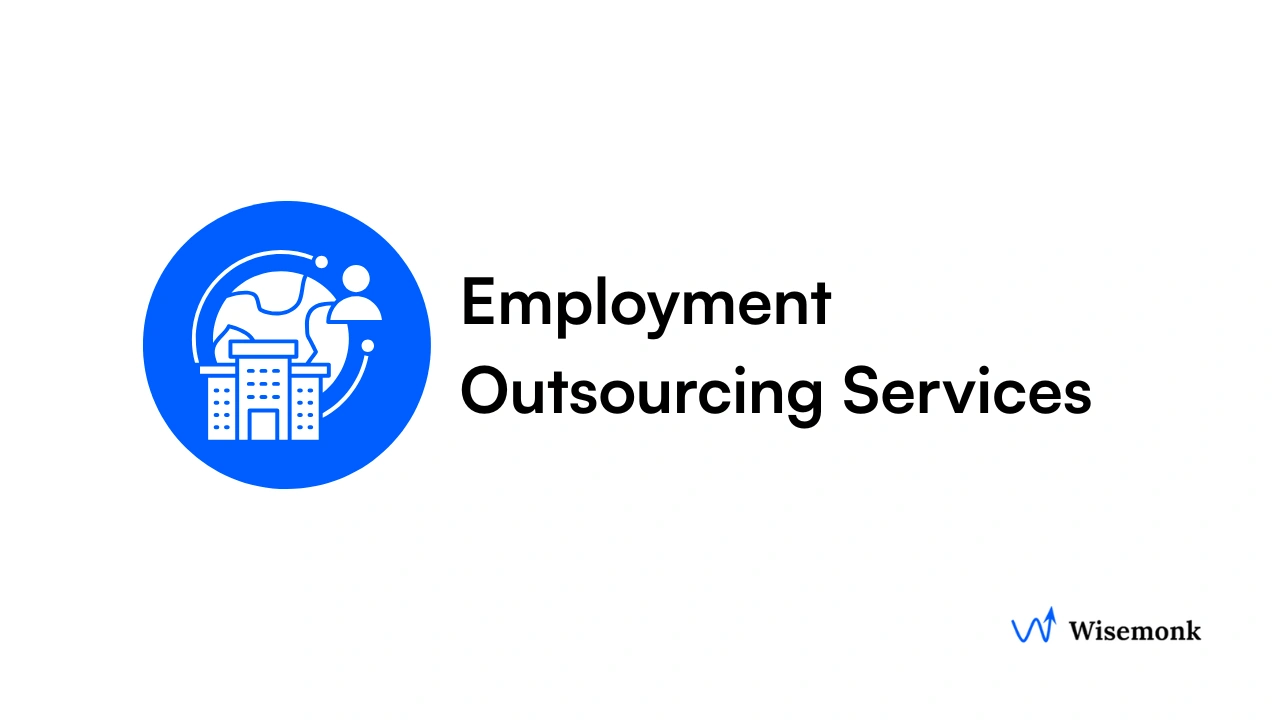
.webp)




.webp)
.webp)
.webp)

.webp)


.webp)


.webp)

.webp)
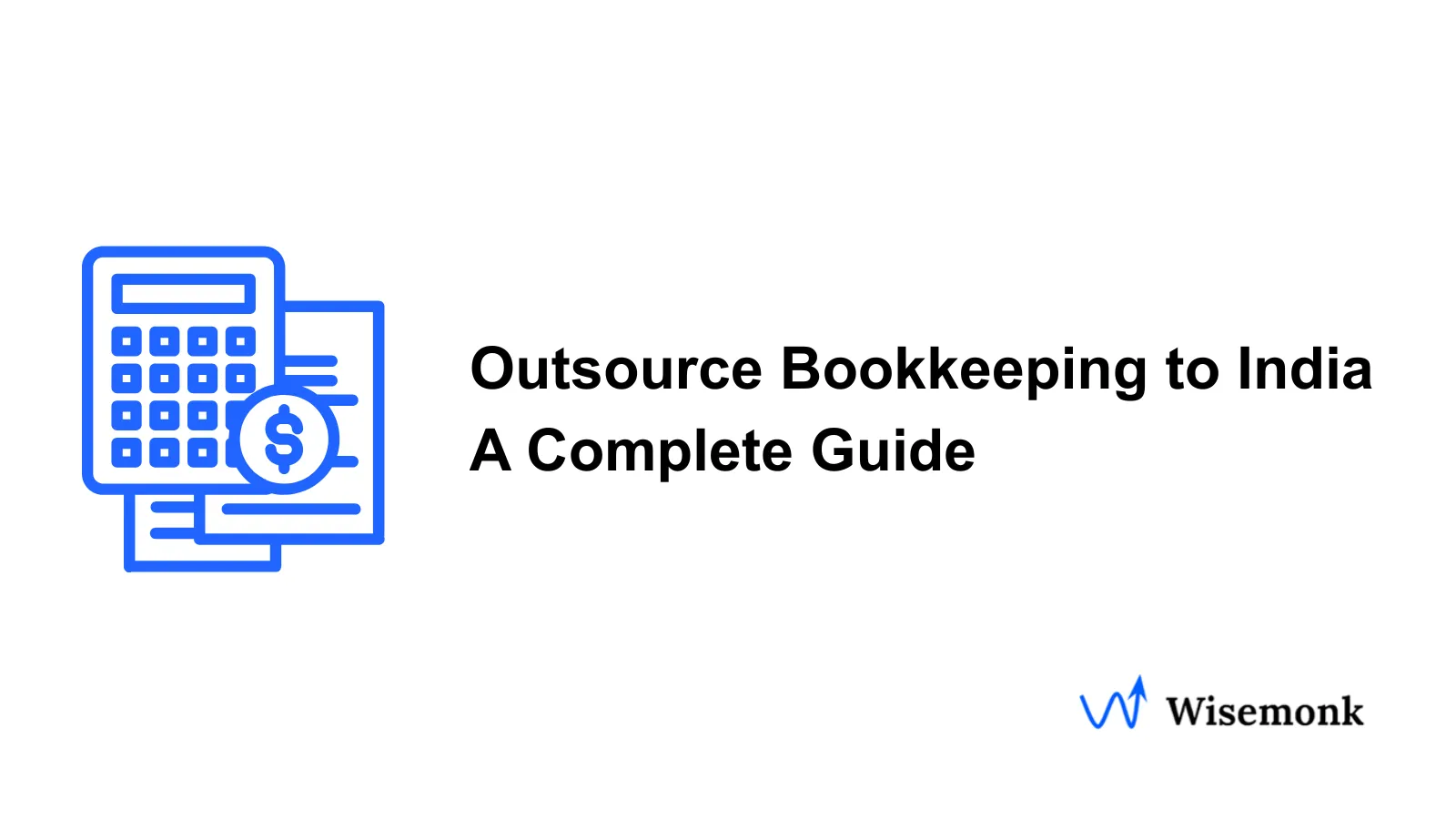
.webp)
.webp)

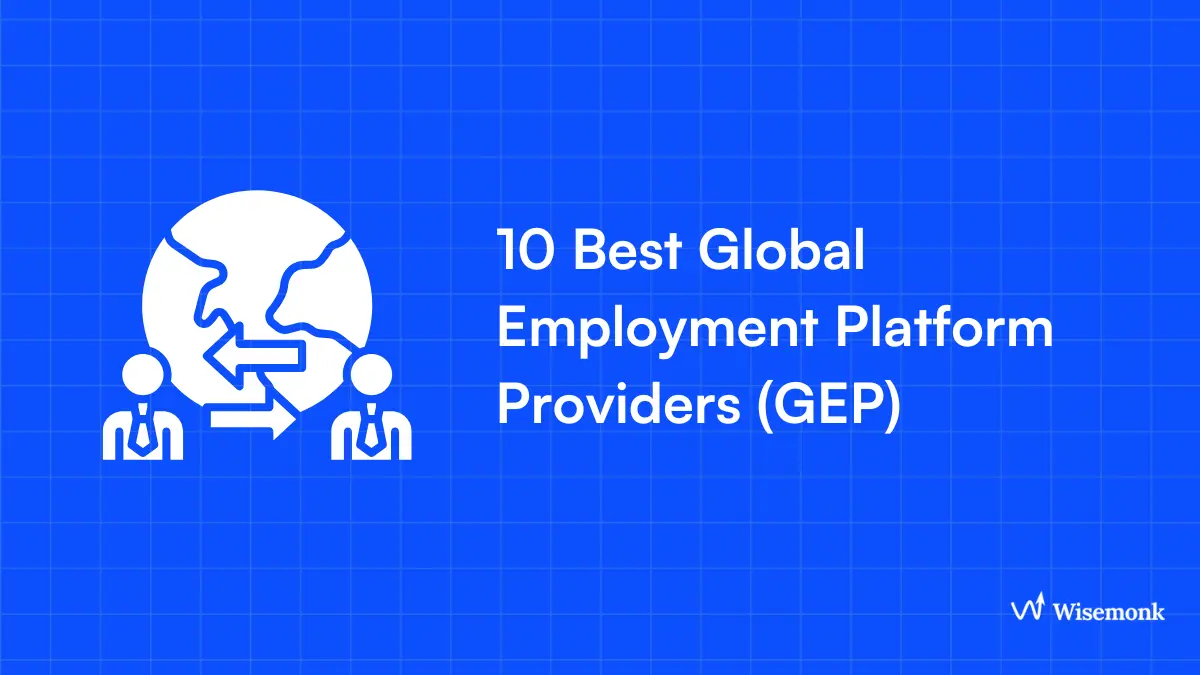
.webp)
